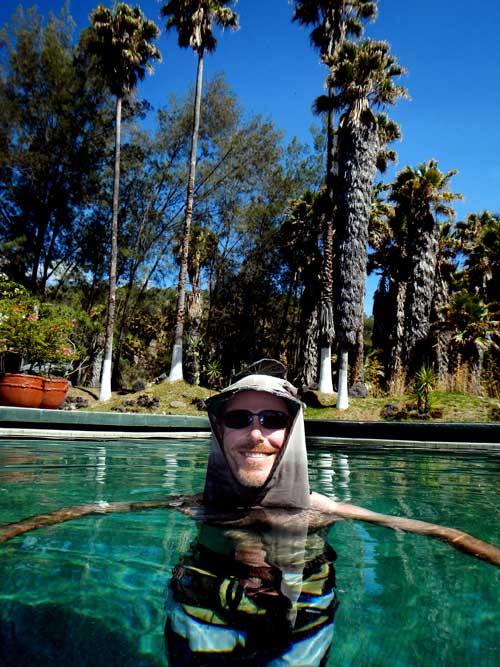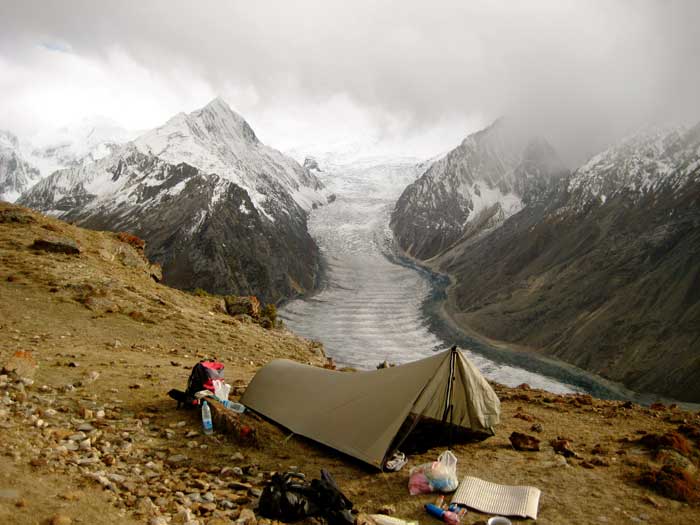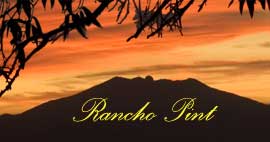|
By John Pint
 While soaking in a pool of hot
mineralized water at famous Río Caliente in Jalisco, Mexico, I
was introduced to a remarkable man. “I’d like you to meet Cam Honan,”
said my friend Diarmuid Milligan. “Like you, he enjoys hiking.” While soaking in a pool of hot
mineralized water at famous Río Caliente in Jalisco, Mexico, I
was introduced to a remarkable man. “I’d like you to meet Cam Honan,”
said my friend Diarmuid Milligan. “Like you, he enjoys hiking.”
What an understatement! I soon discovered that this tall, quiet, often
smiling Australian has circled the globe, hiking along most of the
world’s most beautiful trails, walking so much that he has covered over
80,467 kilometers in 55 countries and is thought by many to hold the
world’s distance record for hiking.
Far more importantly,
during all those hours of walking, Honan’s mind was always working and
I found his reflections on what he was doing fascinating:
“One foot in front of
the other. Everything you need in the world on your back. Wake up with
the sun. Go to sleep when it gets dark. Walk, listen and observe in
between: The Hiking Life.”
So much experience
trekking along the world’s trails also gave Honan a chance to refine
and perfect the art of backpacking. Most of what people carry
is unnecessary, he argues, pointing out that staggering under the
weight of a 20-kilo backpack ruins the beauty and joy of the overall
camping experience and turns off many people.
Cam Honan spent many
years living in Ajijic,Mexico, on the shore of Lake Chapala, where he
collected and exported Mexican artesanías
to Australia. His business left him plenty of free time which he
dedicated to walking. Over the years, he visited exotic countries like
Iceland, Nepal and Pakistan where he hiked along fabled trails.
His most recently
completed project he calls The Twelve Long Walks. These are routes
through some of the most spectacular areas of the USA and Canada, some
of them well known and others created by Honan, some established trails
and others cross country treks (no path). “These 12 walks range in
length from 195 to 2700 miles,” he told me. “The final three trails,
namely the Pacific Crest Trail, the Continental Divide Trail and the
Appalachian Trail, constitute the Triple Crown of American hiking.
These are the three longest hikes, and in the case of the former two,
cross the United States longitudinally from Canada to Mexico, while the
Appalachian Trail falls just shy.”
This north-American
challenge had him walking 14,300 miles over a period of 18 months,
averaging 28 miles per day and wearing out 28 pairs of shoes. By the
time he finished, he had gathered quite a reputation among US and
Canadian hikers, who gave him the nickname Swami (because he does
Yoga). As Appalachian trekker “Dogwood” exclaimed about “Swami”:
“That’s a long, long,
long
distance hiker!”
Although he has covered
over 80,000 kilometers during the last two decades and is now on the
“high, as opposed to wrong” side of 40, he is far from ready to hang up
his boots and says that this coming fall he plans yet another hike
through Mexico’s Copper Canyon, which is really a series of canyons
longer and deeper than the celebrated Grand Canyon in the USA.
Although the
distance he plans to cover will “only” be around 300 to 500 total
kilometers, he says “In some ways the route I have in mind
could be one of the most challenging. It will be a combination of
canyoneering, bushwhacks, scrambling, wading, hiking and hopefully
avoiding drug fields and cartel henchmen.”
For backpacking, Cam
Honan carries only three kilos of equipment—plus food and water.
Instead of a tent, he uses a specially designed poncho which turns into
a tarp/tent when propped up by a hiking pole and weighs only ten
ounces. Instead of a sleeping bag, he has a quilt which also weighs
practically nothing.

Campsite above Barpu Glacier,
Rush Phari Track, Pakistan, 2008 Photo by Cam Honan. You'll find more
outstanding photos at Thehikinglife.com
This “Going Light”
philosophy, he says, manifests itself in two ways; tangibly and
intangibly. “In regards to the former, innovative designs combined with
increasingly lightweight, yet still durable materials, have meant that
manufacturers can now produce incredibly lightweight equipment, without
unduly sacrificing performance or safety. Intangibly
speaking, it constitutes a change of mindset. A reassessment of what we
‘actually’ need, as opposed to what we think or have
been told we need.” I asked him to elaborate on what he calls
“going light.”
“I wish I could say that
I started the Going Light Revolution,” he said with a laugh, “but
unfortunately, I can’t. If you look back a millennium, you had people
like the aboriginals of Australia, the Kalahari Bushmen in Africa, the
Native American population, people who traveled huge distances but did
so traveling very lightly, with an emphasis on the necessities rather
than superfluous luxuries. For me, the principle behind it all is
having an uncluttered approach, a focus on simplicity.”
As for encounters with
wild animals while hiking and camping, Honan had no horror stories to
tell, although he has had a few interesting encounters with grizzly
bears and snakes. On the contrary, he treasures moments like the
morning in Montana when he opened his eyes and found a wolf staring at
him from a distance of seven meters. “Another night, in Minnesota, I
had a moose run right by where I was sleeping. I don’t think he even
saw me.”
It is a sheer delight to
explore Honan’s website, called Thehikinglife.com . First of all, the
pictures he’s taken while trekking around the most beautiful parts of
some 55 countries are breathtaking, even though he carries with him
only a small point-and-shoot. Then you will find comments and
reflections on life and nature which are often inspirational:
“Much of my non-working
life is spent hiking. Deserts, jungles, mountains or coast; I don’t
really have a preference. If I’m out in nature with everything I need
in the world on my back, chances are my smile is wide and my thoughts
are clear.”
Hidden away here and
there are unexpected gems, like this description of a meal in the
mountains of Pakistan:
“There
is a timeless quality to the Shimshal Pamir, which can be attributed in
equal parts to its natural beauty as well as the fact that no one seems
to wear a watch. Situated in the Karakorum Range of the Pakistani
Himalaya, the inhabitants of this region are a herding people.
.. We
gratefully accepted an invitation to join one of the families for
supper. Chalpindok was on the menu, a traditional Shimshali dish which
consists of a type of chapati bread, combined with a thick cheesy sauce
and a liquidy butter. Sounds basic, but the food was delicious.”
I
asked Honan about this meal. He said, “We spoke different languages, we
had different cultures, but I found them to be some of the nicest
people I have ever met. The lady who was hosting us had only three
teeth, but she had the biggest, broadest grin the whole time. I
remember as we were leaving, she gave us all this cheese to take with
us and as we walked out the door the sun was setting. It was one of
those memorable times.”
Also memorable were some
“I can’t believe I ate that” meals:
“Hakarl
is fermented or rotten shark, an Icelandic delicacy. One of the most
disgusting foods I have ever tasted. Whilst on a day hike in Stafafell
National Park on the SE coast of Iceland, I ran into a hippyesque local
farmer and somehow struck up a conversation about Bob Dylan and Miles
Davis. After chatting for some time, he invited me back to his nearby
residence, where family and friends had gathered and Hakarl was part of
the menu. How was it? Smells like ammonia and tastes like a spongy,
chewy, gritty urinal cake that’s seen one too many big Saturday nights.
Thankfully when washed down with liberal quantities of Brennivin (a
popular Icelandic Schnapps), the after taste soon disappears and
becomes nothing more than a disturbing memory.”
Cam Honan gives
presentations to groups and organizations. At the moment, he has three
talks: World’s Greatest Hiking Destinations, Going Light without
Compromising Safety, and Twelve Long Walks through the USA and
Canada. If you can book him, yuou are in for a treat! Contact
him through
www.thehikinglife.com
|

